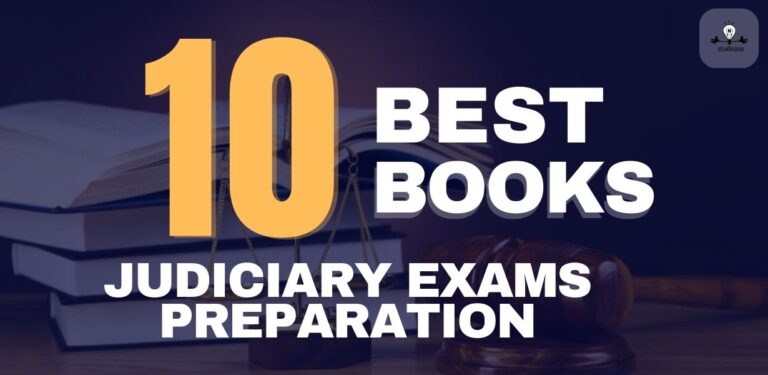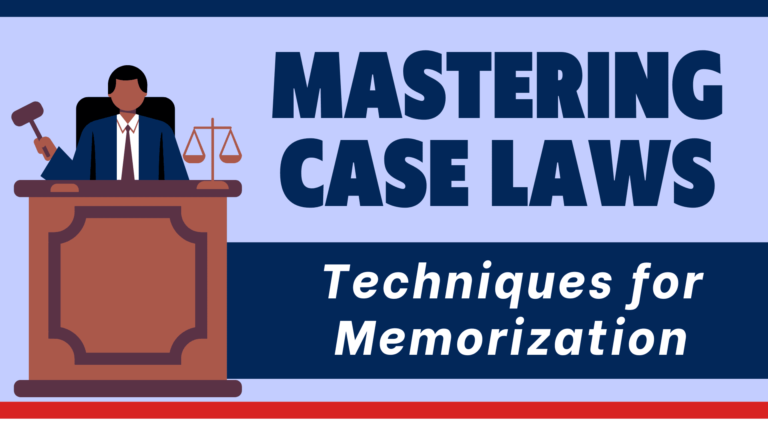How to Ace Judicial Services Exam Without Coaching?

Studying for the judiciary exam can seem overwhelming, especially for law graduates who are opting to prepare without coaching.
Nevertheless, with the correct mindset, it is achievable to succeed in the judicial services exam without external assistance.
In fact, self-study can be an effective way to prepare for the exam, as it allows you to tailor your study plan to your own strengths and weaknesses.

The first step in preparing for the judiciary exam without coaching is to understand the exam pattern and syllabus.
You should be familiar with the different sections of the exam, such as General Knowledge, English, and law, and the weightage given to each section.
This will help you prioritize your study time and focus on the areas that need the most attention.
It is also important to gather study materials, such as textbooks, previous year question papers, and online resources, to supplement your preparation.
Once you have a clear understanding of the exam pattern and syllabus, you can start creating a study plan that works for you.
This may involve setting daily or weekly study goals, breaking down topics into smaller, manageable chunks, and revising regularly.
It is also important to stay motivated and disciplined throughout the preparation period, as self-study requires a lot of self-motivation and dedication.
With the right approach, you can successfully prepare for the judiciary exam without coaching and achieve your goal of becoming a judicial officer.
Understanding the Exam Pattern
To prepare for Judicial Services without coaching, the first step is to understand the exam pattern.
The Judiciary exams consist of two stages: Prelims and Mains. The Prelims exam is usually an objective type test, while the Mains exam is a descriptive type test.
The Prelims exam is designed to test your knowledge of the law and the general awareness.
It consists of multiple-choice questions on topics such as General Knowledge, Current Affairs, English Language, and Legal Aptitude.
It is important to note that the Prelims exam is only a screening test, and you must score above the cut-off to qualify for the Mains exam.
The Mains exam is designed to test your knowledge of the law in greater depth.
It consists of various papers, including Civil Law, Criminal Law, and Language papers. The Mains exam is a descriptive type test, and you must write long answers to the questions asked.
The PT exam is an important exam for Judicial Services. It is a screening test that you must clear to qualify for the Mains exam.
Comprehensive Study Material Collection

When preparing for Judicial Services without coaching, it is essential to have a comprehensive collection of study materials. This collection should include essential textbooks, bare acts, newspapers, legal news, previous year papers, model answers, and revision cycles.
Essential Textbooks and Bare Acts
The first step in building your study material collection is to acquire essential textbooks and bare acts.
These resources are the foundation of your preparation and provide a deep understanding of the law.
Some of the recommended textbooks include “Constitution of India” by DD Basu, “Indian Penal Code” by Ratanlal and Dhirajlal, and “Code of Criminal Procedure” by Ratanlal and Dhirajlal.
Supplementary Reading: Newspapers and Legal News
In addition to textbooks and bare acts, it is crucial to stay up-to-date with legal news and current affairs.
This can be achieved by reading newspapers such as The Hindu, The Indian Express, and The Times of India.
You can also follow legal blogs and websites such as Live Law.
Previous Year Papers and Model Answers
Solving previous year papers and model answers is an excellent way to assess your preparation level and identify areas that require improvement.
You can find these papers and answers in various books and online resources.
Some of the recommended books include “Judicial Services Examinations – Self Study Guide” by Universal Law Publishing and “Judicial Services Examination – Model Question Papers” by Lexis Nexis.
Time Management and Scheduling
Preparing for Judicial Services without coaching requires effective time management and scheduling.
You should create a study plan that allocates sufficient time for each subject and topic.
You can use tools such as calendars, to-do lists, and study planners to ensure that you stay on track.
Balancing Different Law Subjects
Judicial Services examinations cover various law subjects, and it is essential to balance your preparation for each subject.
You should allocate sufficient time for each subject and prioritize based on your strengths and weaknesses.
Regular Revision Cycles
Regular revision is crucial to ensure that you retain the information you have learned.
You should create a revision plan that includes regular revision cycles for each subject.
You can use tools such as flashcards, mind maps, and revision notes to aid your revision.
Skill Building for Judiciary Exams

Preparing for Judiciary exams without coaching can be a daunting task. However, with the right approach and dedication, you can master the necessary skills to succeed in these exams. Here are some essential skills that you need to develop:
Mastering Answer Writing Techniques
Answer writing is a crucial skill that you need to master to excel in Judiciary exams. You should be able to write clear, concise, and well-structured answers that address the question’s requirements.
To do this, you need to understand the question’s demands, organize your thoughts, and present them logically. One way to improve your answer writing skills is to practice writing answers to previous year papers.
This will help you understand the exam pattern, the types of questions asked, and the expected answers’ structure.
You can also seek feedback from experts or your peers to improve your writing skills.
Improving Speed and Accuracy
Judiciary exams are time-bound, and you need to answer a significant number of questions in a limited time. Therefore, improving your speed and accuracy is essential to succeed in these exams.
To improve your speed, you need to practice solving MCQs and previous year papers within the time limit.
This will help you develop a strategy to manage your time effectively and prioritize the questions that you can answer quickly. To improve your accuracy, you need to focus on understanding the concepts and practicing them regularly.
You can also use mnemonic techniques, mind maps, or flashcards to remember the important concepts and definitions.
Judgment Writing Practice
Judgment writing is a critical skill that you need to develop to succeed in Judiciary exams.
You should be able to analyze the facts, apply the relevant laws, and write a clear and concise judgment that addresses the question’s requirements.
To improve your judgment writing skills, you need to practice writing judgments based on case studies or previous year papers.
You can also seek feedback from experts or your peers to improve your writing skills.
Enhancing Legal Knowledge

Aspiring candidates for Judicial Services must have a thorough understanding of the legal system and the laws that govern it. While coaching can be helpful, it is possible to enhance your legal knowledge without it. Here are some ways to do so:
In-depth Study of Procedural Laws
One of the most important aspects of preparing for Judicial Services is to have a deep understanding of the procedural laws.
These include the Code of Civil Procedure (CPC), Penal Code, the Code of Criminal Procedure (CrPC), and the Indian Evidence Act. You should have a clear understanding of the various stages of a trial, the rules of evidence, and the different types of writs.
To enhance your knowledge of procedural laws, you can refer to standard textbooks such as Takwani’s Code of Civil Procedure, Ratanlal and Dhirajlal’s Code of Criminal Procedure, and Batuklal’s Law of Evidence.
You can also refer to online resources such as legal blogs and websites that provide updates on recent legal developments.
Understanding Substantive Law
In addition to procedural laws, it is important to have a good understanding of substantive laws.
To enhance your knowledge of substantive law, you can refer to standard textbooks such as Pollock and Mulla’s Indian Contract Act, R.K. Sinha’s Property Law.
You can also attend seminars and workshops conducted by legal experts to gain a better understanding of these laws.
Keeping Up with Legal Developments
The legal system is constantly evolving, and it is important to keep up with the latest legal developments.
You can do this by reading legal newspapers and journals, attending conferences and seminars, and following legal blogs and websites.
This will help you stay updated on recent judgments, new laws, and changes in legal procedures.
Self-Assessment and Feedback
One critical aspect of Judicial Services Exam preparation is self-assessment and feedback. Here are some essential steps you can take to ensure that you are on track to achieving your goals:
Conducting Mock Tests
Mock tests are an essential part of self-assessment. They help you identify your strengths and weaknesses and provide an opportunity to practice your skills in a simulated environment.
Make sure to create a realistic testing environment when conducting mock tests.
Set a timer, turn off your phone, and avoid distractions. This will help you get a better idea of your actual performance.
Analyzing Performance and Progress
After conducting a mock test, take the time to analyze your performance and progress.
Identify the areas where you performed well and the areas where you need to improve.
Keep a record of your progress, and use it to track your improvement over time. This will help you stay motivated and focused on your goals.
Learning from Mistakes
Mistakes are an inevitable part of the learning process.
Instead of getting discouraged, use your mistakes as an opportunity to learn and improve.
Analyze the mistakes you made in your mock tests, and identify the areas where you need to focus your attention.
Use this information to create a study plan that addresses your weaknesses.
Maintaining Mental Health
Preparing for Judicial Services can be stressful, and it is essential to take care of your mental health. Make sure to take breaks when you need them, and avoid overworking yourself.
Engage in activities that help you relax and destress, such as meditation, yoga, or reading.
Physical Fitness and Stress Management
Physical fitness is also essential for maintaining good mental health. Make sure to exercise regularly and eat a healthy diet.
This will help you manage stress and stay focused on your goals. You can also try stress management techniques such as deep breathing, visualization, or progressive muscle relaxation.
Interview Preparation

Preparing for the interview round is crucial in your journey to becoming a civil judge. Here are some tips to help you prepare for the interview:
Developing Communication Skills
Communication skills are essential for any judge. As a judge, you will need to communicate clearly and effectively with lawyers and other court officials.
To develop your communication skills, you can:
- Practice speaking with a friend
- Join a public speaking club or take a communication course
- Read books on effective communication
Remember to speak clearly, listen carefully, and be confident in your communication.
Understanding the Role of a Judge
To prepare for the interview, you should have a clear understanding of the role of a judge. A judge is responsible for interpreting and enforcing the law, ensuring a fair trial for all parties involved, and upholding the integrity of the justice system.
You should be familiar with the legal system and the laws that pertain to your area of jurisdiction.
During the interview, you may be asked about your views on certain legal issues. It is important to be honest and clear in your responses, while also demonstrating your knowledge and understanding of the law.
Final Tips and Encouragement

Here are some final tips and encouragement to help you stay motivated throughout the journey.
Staying Motivated throughout the Journey
Staying motivated throughout the journey is crucial to your success. It’s easy to get discouraged when you face challenges, but remember why you started.
Keep a positive attitude and focus on your goals. Set small achievable milestones and celebrate your progress. Surround yourself with positive people who support your aspirations and can keep you motivated.
Seeking Guidance from Mentors
Mentors can be a valuable source of guidance and inspiration.
Seek out experienced judiciary aspirants or legal professionals who can provide you with valuable insights and advice. They can help you understand the nuances of judiciary preparation, provide you with study materials, and even help you prepare for interviews.
Mentors can also offer you emotional support and encouragement when you face challenges.
Remember, as a law student or a judiciary aspirant, you are preparing for a career in the judiciary. It’s a challenging and rewarding career that requires dedication and discipline.
Keep your focus, stay motivated, seek guidance from mentors, and you will achieve your goal. All the Best!






